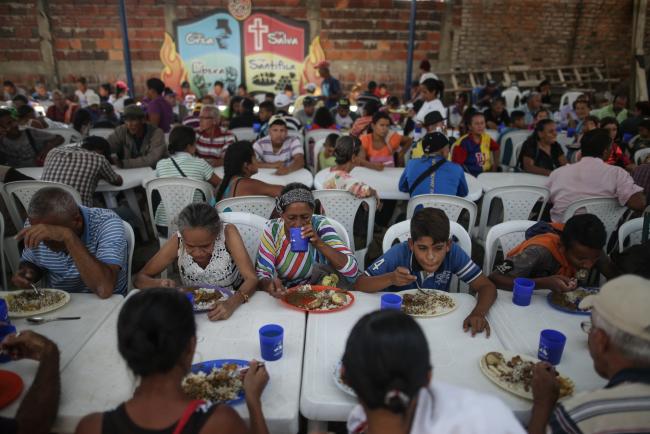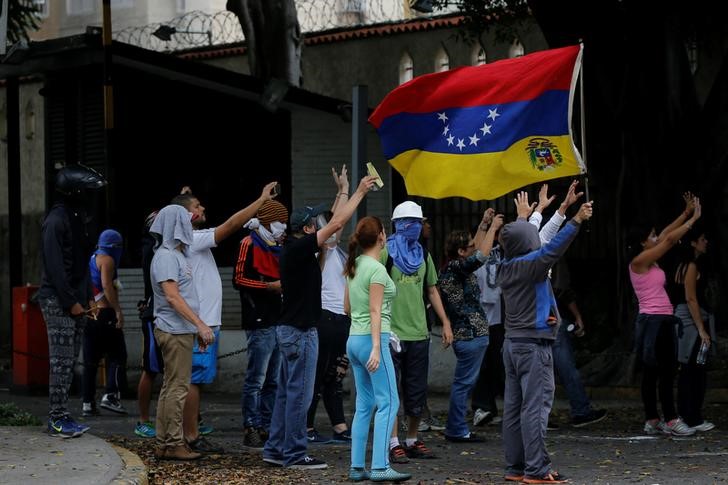(Bloomberg) -- Thousands of volunteers will organize relief caravans that will enter a starving Venezuela on Feb. 23, National Assembly leader Juan Guaido said Tuesday, setting up a direct confrontation with President Nicolas Maduro.
Truckloads of food and medicine have been piling up for days just over the Colombian border after Maduro barricaded entry points, contending that the shipments are meant to humiliate and undermine him. By rallying supporters around a firm date to confront Maduro’s forces, Guaido is trying to accelerate his three-week push to oust the autocrat and pave the way for new elections.
“The armed forces will have a few days to decide whether to stand by the constitution and allow the entry of humanitarian aid," Guaido told thousands of opposition marchers Tuesday. "Enough of hunger, of misery, of usurpation of power."
Read a QuickTake: Why Venezuela Has Two Presidents, One Thorny Standoff
Guaido, who says he’s the rightful leader of Venezuela after Maduro’s election was widely disputed, has made a political tool of the food stalled in the Colombian border town of Cucuta. Traditional aid groups have shunned the effort as a ploy, and it’s been unclear whether the trailers of rice, flour and other staples would actually be able enter the country. Maduro’s security forces are using shipping containers and a tractor-trailer to close off an international bridge.
‘In Caravans’
Guaido’s supporters had spoken of using clandestine means, even bringing it in by sea. He said Tuesday that 250,000 people have signed up on a website to volunteer for his initiative. “We’ll have to go in caravans, as a protest,” he said.
While Venezuela faces deep shortages of necessities like antibiotics, first-aid supplies and baby formula, Maduro has portrayed the shipments as a pretext for an invasion, sent to humiliate him and undermine his presidency.
Vice President Delcy Rodriguez said at a news conference Tuesday that the food sent by the U.S. is a “biological weapon.”
“That humanitarian aid is contaminated and poisoned,” she claimed. “It’s carcinogenic. This has been proven by different scientific studies.”
‘So Desperate’
The U.S. Agency for International Development has said the first phase of a $20 million assistance program will include food and hygiene kits, nutritional supplements and emergency medical kits. Lester Toledo, Guaido’s international coordinator for humanitarian aid, said Brazil had authorized a collection center in the border state of Roraima. Supplies will also come through a Caribbean island.
At the blocked Tienditas Bridge in Cucucta, small groups of opposition protesters gathered Tuesday, singing the national anthem and praying the Lord’s Prayer.
"Our relatives and our compatriots die for the lack of antibiotics or something as simple as a dehydration caused by diarrhea," said Rafael Polos, a 48-year-old former airport manager who fled to Colombia and now sells candies in the street. "The change in Venezuela is close. We are so desperate. In fact we wanted to enter the bridge and take all that humanitarian aid to Venezuela, but we have to do things the right way."
Tuesday’s protests were the third protest in the past two weeks against Maduro, the largest wave of overt resistance since 2017. The regime has largely allowed citizens to march, however, police have raided neighborhoods at night in search of opposition supporters. At least 35 people have died and more than 850 have been detained, according to human-rights groups including Provea and Penal Forum.
In eastern Caracas, Guaido’s supporters filled the streets. People streamed down Francisco de Miranda Avenue, draping flags over their shoulders and holding signs. Shops and restaurants remained open, but some of the main avenues in downtown Caracas were closed near a plaza where government supporters took in a video address from Maduro. A large truck blasted reggaeton with government propaganda.
The opposition march filled several blocks with thousands of people, and it seemed more like a celebration than a protest. Rap singers took selfies with demonstrators, who walked with small children or dogs. There were no hooded protesters or the confrontational mood seen in 2017.
“We’re moving forward. We have international support, and soon we’ll open a path for elections," said Nathalie Torres, 37, a shopkeeper. She was marching from the working-class neighborhood of La Candelaria alongside three other women, all wearing white shirts and tricolor hats. At least one U.S. flag waved amid the Venezuelan colors.
Many fewer people came to the rally point for the regime’s march: Hundreds filled only a couple of blocks, despite the government buses that lined the streets to transport them. Many who marched were state employees and wore shirts and hats representing ministries and public institutions.
"The United States refuses to understand that we are free,” said Pedro Villegas, 25, a student leader in Maduro’s socialist PSUV party. “Guaido is a lackey; he has been imposed by a foreign agenda to steal power.”
(Updates to add vice president’s comment in seventh paragraph.)


